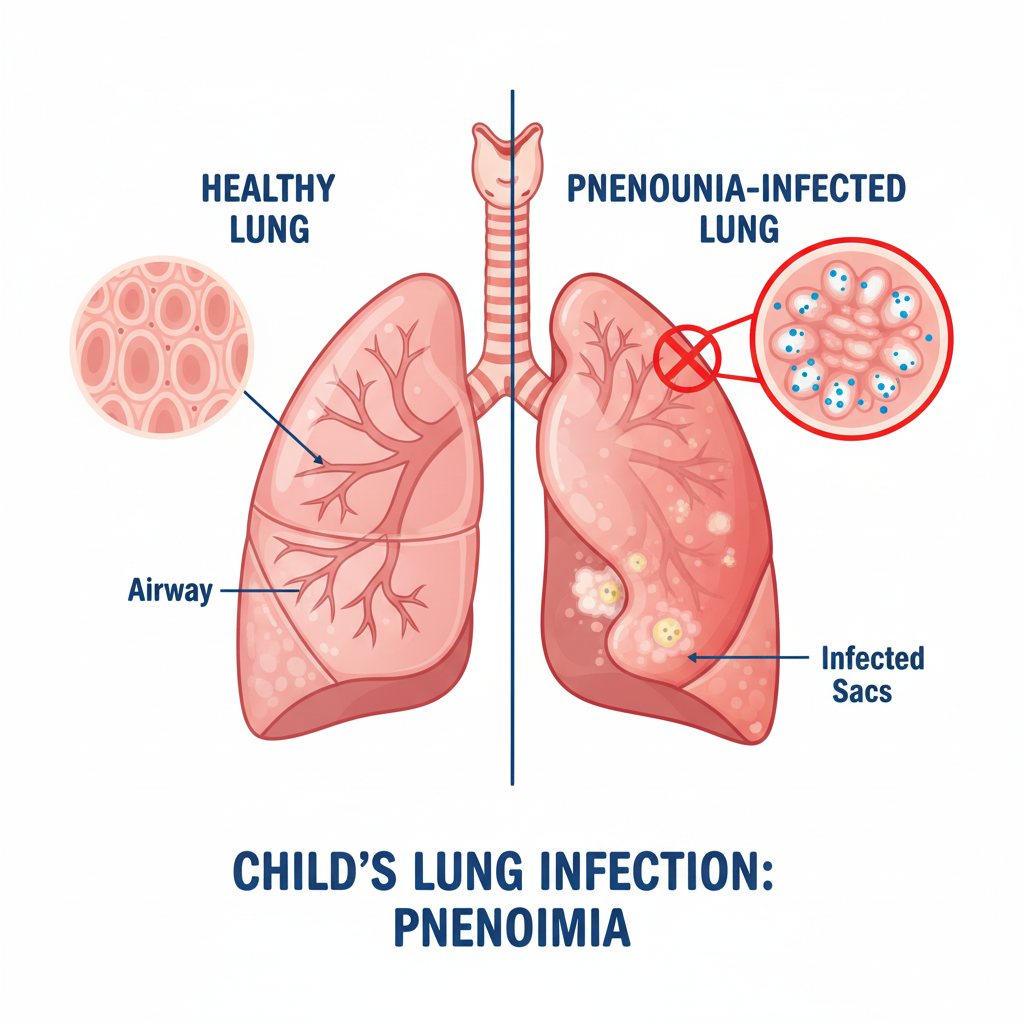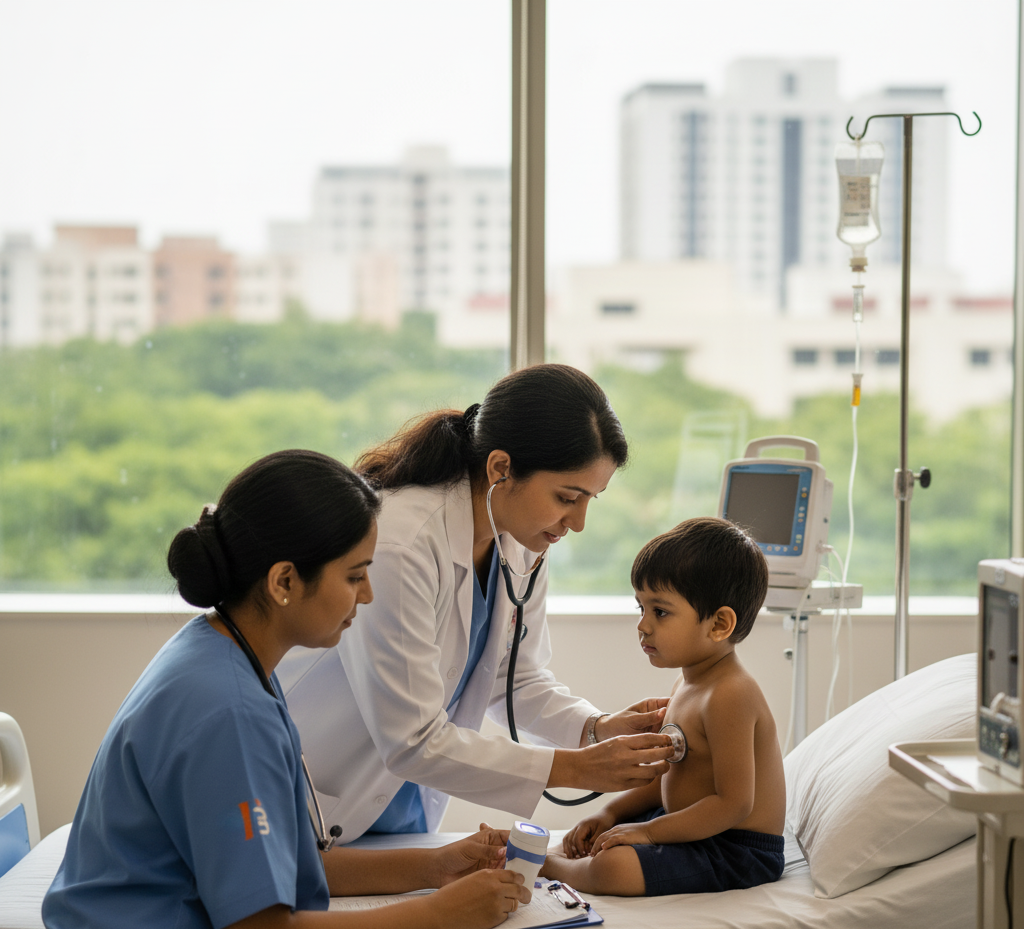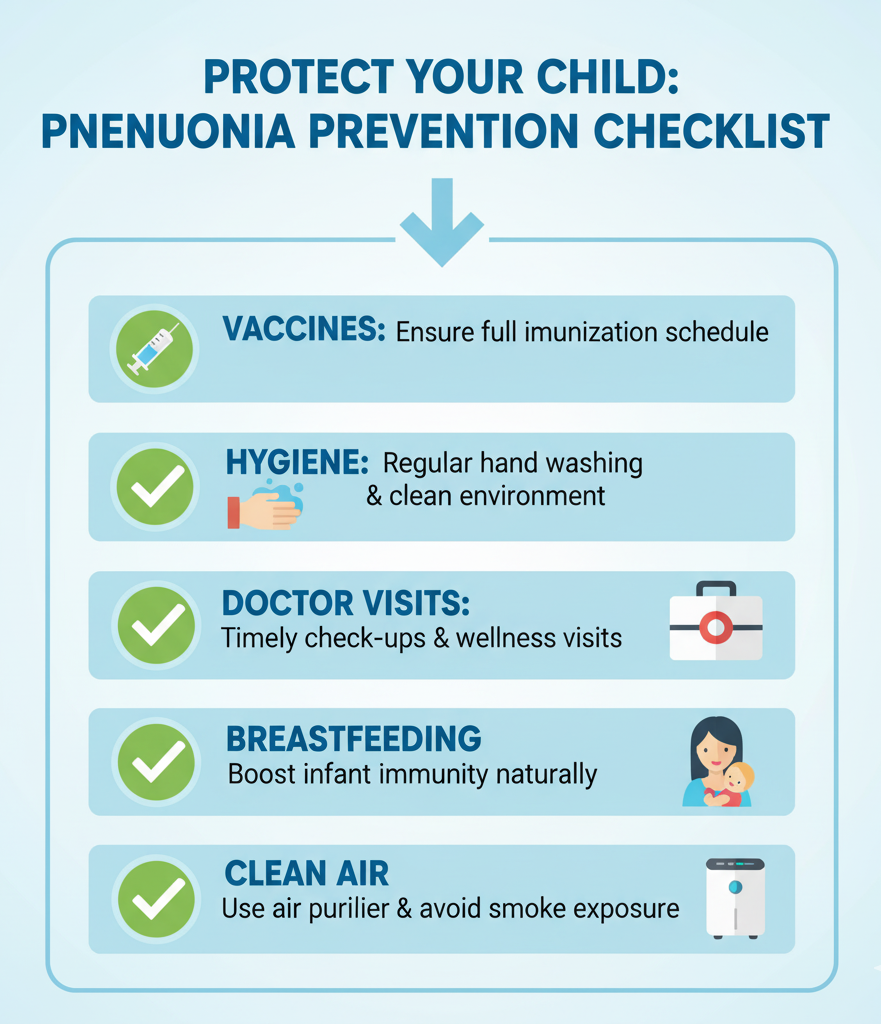Introduction
Pneumonia in children is once again on the rise across Bengaluru, alarming both parents and healthcare experts. In recent weeks, pediatric hospitals have reported a sharp increase in respiratory infections, many caused by Streptococcus pneumoniae and Respiratory Syncytial Virus (RSV). Doctors are urging parents to prioritise vaccination and timely medical care to protect their children from this life-threatening illness.
Childhood pneumonia is not just a seasonal illness—it’s one of the leading causes of death among children under five worldwide. Fortunately, it’s also one of the most preventable through timely immunisation, good hygiene, and early diagnosis.
Overview: Pneumonia in Children
Pneumonia is an infection that inflames the air sacs in one or both lungs. These air sacs may fill with fluid or pus, leading to coughing, fever, chills, and breathing difficulties.
In children, pneumonia can progress rapidly due to smaller airways and lower immunity levels. Bengaluru’s fluctuating weather, air pollution, and post-festival viral outbreaks have contributed to the recent spike in cases.
Doctors report that most admissions are children below five years, particularly those who have missed routine pneumococcal or influenza vaccines.
Causes of Pneumonia in Children
Pneumonia can be caused by several infectious agents:
-
Bacteria: Streptococcus pneumoniae, Haemophilus influenzae type b (Hib), Staphylococcus aureus
-
Viruses: RSV, influenza, COVID-19, adenovirus
-
Fungi: Rare in healthy children, but can affect immunocompromised ones
Environmental and lifestyle factors also increase risk:
-
Exposure to secondhand smoke
-
Air pollution (PM2.5 levels in Bengaluru are consistently high)
-
Malnutrition or vitamin deficiencies
-
Crowded daycare or school environments
Symptoms to Watch For
Parents should be alert to the following early signs of pneumonia:
-
Persistent cough with mucus
-
Rapid or laboured breathing
-
Chest pain or discomfort
-
High fever (≥102°F / 38.9°C)
-
Bluish lips or nails (a sign of low oxygen)
-
Poor feeding or loss of appetite
-
Fatigue and irritability
Tip: If your child’s breathing seems faster than normal or you notice chest indrawing (visible pulling of the chest while breathing), seek immediate medical help.
Diagnosis and Medical Evaluation
Paediatricians in Bengaluru emphasize that early detection saves lives. A child with suspected pneumonia may undergo:
-
Physical examination: Listening for crackling or wheezing sounds in lungs
-
Chest X-ray: Confirms lung involvement
-
Blood tests: Detects bacterial or viral infection
-
Pulse oximetry: Checks oxygen levels in blood
-
Sputum or nasal swab test: Identifies specific pathogens
Children with mild infections may recover at home with antibiotics or antivirals, while severe cases require hospital admission and oxygen therapy.
Treatment Options
Treatment depends on the cause and severity:
1. Bacterial Pneumonia
-
Antibiotics: Amoxicillin or azithromycin (doctor-prescribed only)
-
Supportive care: Fever management with paracetamol, hydration, and rest
2. Viral Pneumonia
-
No specific antibiotic treatment
-
Antivirals may be prescribed in certain cases (e.g., influenza)
-
Focus on symptom relief and hydration
3. Severe Cases
-
Hospitalisation
-
Oxygen therapy or nebulisation
-
Intravenous fluids
-
Monitoring for complications like pleural effusion
ALSO READ: Beyond Your Birth Date: How Biological Age Testing Is Redefining Health Insights
The Role of Vaccination
Vaccination is the single most effective preventive measure against pneumonia in children. The Indian Academy of Pediatrics (IAP) and WHO recommend:
-
Pneumococcal Conjugate Vaccine (PCV13 or PCV10) — at 6, 10, and 14 weeks of age
-
Hib Vaccine — protects against Haemophilus influenzae type b
-
Influenza Vaccine — yearly, especially before winter
-
Measles and COVID-19 vaccines — prevent respiratory complications
Dr. Anitha S., a senior paediatrician in Bengaluru, says:
“We are seeing more pneumonia cases among children who have missed one or more vaccine doses. Immunisation schedules must not be delayed or skipped, even during mild illness.”
Lifestyle and Home Care Tips
Along with vaccination, parents can take these steps:
-
Ensure your child has a nutritious diet rich in fruits, vegetables, and proteins.
-
Maintain clean air indoors — avoid smoking near children.
-
Encourage handwashing and mask use in crowded areas.
-
Keep the home environment dust-free and well-ventilated.
-
Make sure the child completes the full vaccine schedule recommended by your paediatrician.
Prevention: What Parents Should Know
-
Stick to the vaccination schedule: Visit your paediatrician regularly.
-
Avoid self-medication: Cough syrups and antibiotics without prescription can worsen resistance.
-
Breastfeeding: Strengthens immunity in infants.
-
Avoid pollution exposure: Use air purifiers or masks during high-smog days.
-
Stay hydrated: Helps thin mucus and ease breathing.
When to See a Doctor
Seek immediate medical help if your child has:
-
Difficulty breathing or bluish lips
-
Persistent high fever
-
Chest pain or rapid breathing
-
Refusal to eat or drink
-
Extreme sleepiness or unresponsiveness
Quickobook Tip: You can book an appointment with a paediatrician in Bengaluru instantly through Quickobook.com for same-day consultations and vaccination guidance.
Risks and Complications
If untreated or diagnosed late, pneumonia can lead to:
-
Sepsis (infection spreading to the bloodstream)
-
Pleural effusion (fluid around lungs)
-
Lung abscess
-
Recurrent pneumonia due to weak immunity
-
Long-term respiratory weakness
Conclusion
Pneumonia in children is preventable, treatable, and manageable when addressed promptly. Bengaluru’s doctors are rightly urging parents to act now—ensure full vaccination, monitor symptoms closely, and seek early medical care.
By staying vigilant and informed, parents can protect their children’s lungs, reduce hospitalisations, and promote a healthier community.
Quickobook Call to Action
Need a paediatrician in Bengaluru or want to check your child’s vaccination schedule?
Book trusted doctors near you on Quickobook.com — fast, reliable, and available 24x7 for in-clinic or online consultation.
Disclaimer
This blog is for educational purposes only and not a substitute for medical advice. Always consult a qualified paediatrician before starting or skipping any treatment or vaccine.
50 FAQs About Pneumonia in Children
Q1. What is pneumonia in children?
A lung infection that causes inflammation and fluid buildup in air sacs, making breathing difficult.
Q2. What causes pneumonia in children?
It’s caused by bacteria, viruses, or fungi—commonly Streptococcus pneumoniae or RSV.
Q3. Can pneumonia spread from one child to another?
Yes. It spreads through coughing, sneezing, or contact with respiratory droplets.
Q4. What age group is most affected by pneumonia?
Children under five years are most vulnerable.
Q5. Is pneumonia contagious?
Yes, especially viral and bacterial types transmitted through the air.
Q6. What are the early signs of pneumonia?
Fever, cough, rapid breathing, and chest discomfort.
Q7. Can pneumonia be prevented?
Yes, with vaccination, hygiene, and proper nutrition.
Q8. What is the pneumonia vaccine for children?
The Pneumococcal Conjugate Vaccine (PCV13 or PCV10).
Q9. At what age should a child receive the pneumonia vaccine?
At 6, 10, and 14 weeks, as per India’s immunisation schedule.
Q10. Is pneumonia vaccine part of India’s national immunisation programme?
Yes, it’s included under the Universal Immunisation Programme (UIP).
Q11. Can pneumonia occur even after vaccination?
Yes, but cases are usually milder and recover faster.
Q12. How long does pneumonia last?
Usually 1–3 weeks with treatment; longer in severe cases.
Q13. Can pneumonia cause long-term damage?
If untreated, it may weaken lungs or cause repeated infections.
Q14. What are home remedies for mild pneumonia?
Rest, fluids, steam inhalation, and fever control—under medical guidance.
Q15. Should I give antibiotics without prescription?
No. Self-medication can cause resistance and harm.
Q16. When should a child with cough be tested for pneumonia?
If cough is persistent with fever and laboured breathing.
Q17. Can air pollution cause pneumonia?
It doesn’t cause it directly but weakens lungs, making infections easier.
Q18. What is the cost of pneumonia treatment in India?
₹2,000–₹25,000 depending on severity and hospital.
Q19. How do doctors diagnose pneumonia?
Via chest X-ray, oxygen test, and physical exam.
Q20. Can pneumonia recur in children?
Yes, especially with weak immunity or chronic lung conditions.
Q21. What is walking pneumonia?
A mild type where symptoms are less severe but contagious.
Q22. Can pneumonia cause death in children?
Sadly, yes, if untreated or detected late.
Q23. How can breastfeeding help prevent pneumonia?
It strengthens the baby’s immunity naturally.
Q24. Can pneumonia affect newborns?
Yes, particularly those with low birth weight or premature birth.
Q25. What is community-acquired pneumonia?
Pneumonia caught outside hospitals, usually due to bacteria or viruses.
Q26. Can RSV cause pneumonia?
Yes, RSV is a common viral cause in infants.
Q27. Can children with asthma get pneumonia more easily?
Yes, their lungs are more sensitive to infections.
Q28. Is pneumonia seasonal?
Yes, spikes occur during winter and post-monsoon.
Q29. Can vaccination prevent all types of pneumonia?
It prevents major bacterial types, especially pneumococcal.
Q30. What is Hib vaccine?
Protects against Haemophilus influenzae type b, another pneumonia cause.
Q31. Is flu vaccine important?
Yes, it prevents influenza-related lung infections.
Q32. Should sick children still get vaccinated?
Mild illness is okay, but consult a paediatrician first.
Q33. Are vaccines safe for infants?
Yes, thoroughly tested and approved by WHO and IAP.
Q34. What if my child missed a vaccine dose?
Get a catch-up schedule from your doctor immediately.
Q35. How does pneumonia affect oxygen levels?
It reduces oxygen absorption due to fluid in lungs.
Q36. Can steam inhalation help?
It can relieve congestion but doesn’t cure infection.
Q37. Should I keep my child home from school?
Yes, until fever and cough subside to prevent spread.
Q38. Can herbal medicines cure pneumonia?
No, only medical treatment is proven effective.
Q39. Is it safe to fly with pneumonia?
Not recommended, as oxygen levels may drop.
Q40. How do I clean my child’s nebuliser?
Wash with warm soapy water and dry after every use.
Q41. Can pneumonia return after recovery?
Yes, especially in children with low immunity.
Q42. How long should antibiotics be taken?
As prescribed—never stop midway.
Q43. Can diet help recovery?
Yes, balanced meals rich in proteins and vitamins help healing.
Q44. Should I isolate a child with pneumonia?
Yes, keep them away from infants and elderly until recovery.
Q45. Does humidity affect pneumonia?
High humidity can worsen symptoms; use a dehumidifier if needed.
Q46. What is double pneumonia?
Infection in both lungs simultaneously.
Q47. How can I check my child’s breathing rate?
Count breaths per minute; >40/min in infants may indicate pneumonia.
Q48. Is cough always a symptom of pneumonia?
Usually, yes, though dry cough can also occur.
Q49. Can pneumonia be confused with bronchitis?
Yes, symptoms overlap—doctor’s diagnosis is essential.
Q50. How can Quickobook help with vaccination?
Quickobook lets you find certified paediatricians, schedule vaccines, and track immunisations easily online.












Comments (0)
No comments yet. Be the first to share your thoughts!
Leave a Comment